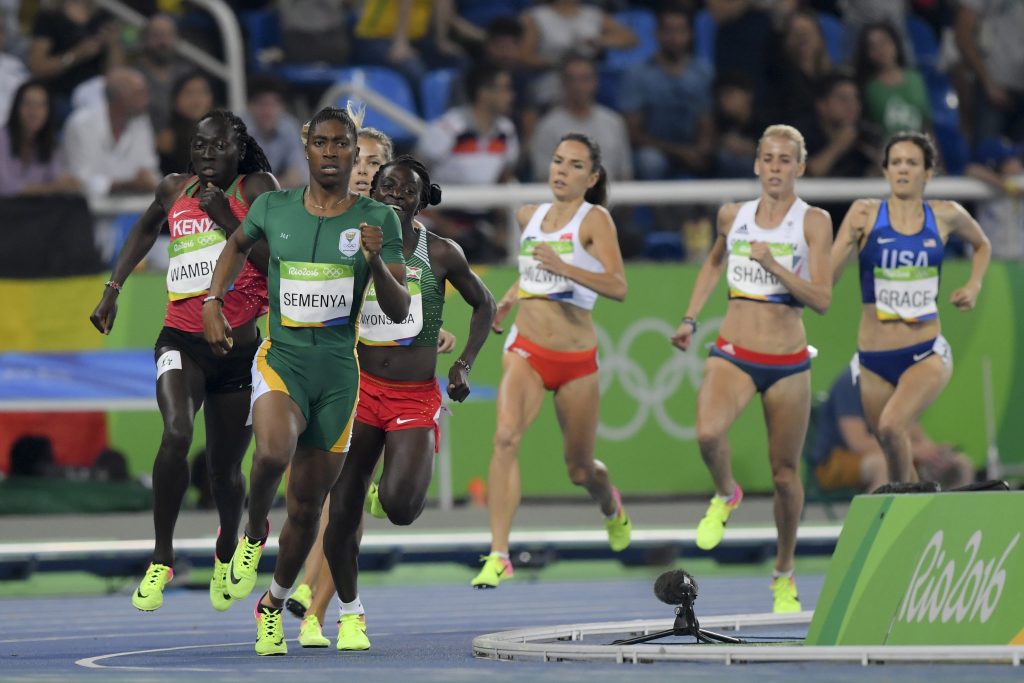Recently, Caster Semenya, a black South African medium-distance runner, was targeted by a change in International Association of Athletics Federations (IAAF) policy which requires female athletes with too much testosterone to take medication to reduce their body’s natural level of testosterone. Semenya unsuccessfully sued the IAAF, a regulatory body for international athletics, meaning the policy will come into effect on May 8. This reactionary policy highlights one of the main problems with the modern attempts to regulate the gender-sex binary and with the popular media’s coverage of transgender and intersex issues.
For full disclosure, I am a cisgender man. As far as I know, I do not have any intersex characteristics. As far as I know. Unless I get a CAT scan, I don’t know whether or not I have a uterus and fallopian tubes, a condition called persistent Müllerian duct syndrome, which is just one of many dozen permutations of the natural spectrum of human sexual characteristics. Unless I get my blood tested, I can’t know whether I have abnormal levels of testosterone or estrogen, or even if I have two X chromosomes, a condition called Klinefelter syndrome. According to the National Institutes of Health, up to 75 percent of those with XXY chromosomes are never diagnosed. About as many people are intersex as have red hair. If a person’s status as intersex so often goes unnoticed, why was Semenya’s recognized?
By forcing Semenya and other hyperandrogenous female athletes to artificially reduce their levels of testosterone, the IAAF is policing and defining what it means to be a woman and what it means to be female. According to these people, it’s not what’s in your head, your pants or your genes that makes you male or female, it’s the hormones in your blood. No matter what rationale is used to divide people up into these categories of male and female, man and woman, these categories are ultimately untenable. The binary division of athletics into male and female divisions reinforces and reifies these exclusionary categories. Though this policy is claimed to be for the purpose of fair play, it is only targeted toward those who are already defined by legal and medical discourses as different or other. Semenya is a queer, black athlete with some phenotypic, also known as superficial, traits which we define as “masculine.”
Recent discussions around transgender athletes similarly circulate around enforcing “fair play” at the cost of concretizing, institutionalizing and biologizing binary notions of sex and gender. Media pundits and YouTube videos condemning transgender athletes rack up millions of views and thousands of transphobic comments. These people don’t care about “protecting the integrity of the sport,” they only care that the trophies and the prize money are going to the “right” kind of athlete. The unfairness of transgender (or intersex) athletes winning trophies over “normally” sexed individuals is insignificant compared to the everyday unfairness faced by gender nonconforming people that is reinforced by policies such as these.
The Human Rights Campaign’s 2014 State Equality Index found that if you’re transgender, you can be fired in 33 states, kicked out of your house in 32 states and denied access to public accommodations in 35 states. Transgender folk, particularly those of color, are also victim to some of the highest rates of homicide, sexual assault and suicide. There is currently a case in the U.S. Supreme Court, R.G. & G.R. Harris Funeral Homes Inc. v. Equal Employment Opportunity Commission, which may decide whether gender identity employment discrimination is constitutional. Given the current conservative makeup of the court, a ruling favorable toward transgender rights seems unlikely. We should be talking about how Aimee Stephens, the plaintiff in this case, lost her job because of legalized bigotry, not how Semenya won races because she doesn’t fit some dominant notion of what it means to be female, or how Mary Gregory, a transgender woman, “unfairly” broke four women’s weightlifting records.
Policing the levels of hormones, the genitals or the chromosomes won’t make sports more fair. It will instead create another public arena in which people can be excluded, shamed, shunned and harmed. If we want to make sure our society and its games are fair, let’s work on passing legal protections and medical recognition for transgender and intersex people and enact practices that undermine our binary systems of sex and gender rather than perpetuate ones that strengthen them.
Brian Neggie is a senior double-majoring in English and anthropology.



